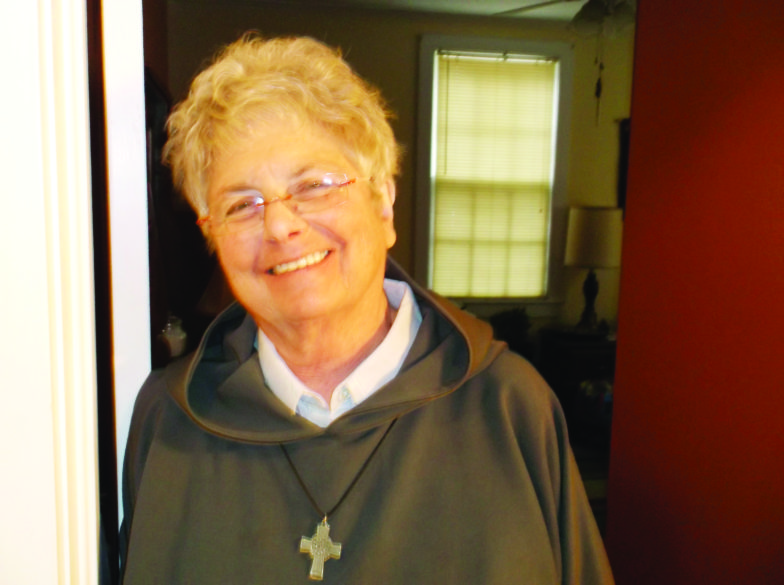From the hermitage
By Sister alies therese
It is heaving I mean fierce good ‘ole tropical summer Southern Mississippi rain and I imagine God weeping over us. Weeping and weeping, weeping over Jerusalem because we just don’t get it. What is ‘it’? Well, we are made in the image of God, each one of us, not just the privileged. Do we experience our God gazing with love at us and mourning, almost saying, ‘after all that trouble My Jesus went to…?’

The band-aid has been ripped off some of the cancerous wound. Can we be cleansed? I find that difficult. You? I am reminded that our systems advantage one and clearly disadvantage another. (Consider Frederick Douglass’ speech on July 4, 1852.) Or worse, I suppose, is that ‘I know’ and ‘have known’ all along but have done nothing, or very little. Why does change only come when there is murder, anxiety, systemic racism, death penalty, abortion, virus, disease, abuse, hatred, hopelessness and brutality? They all sound very death-dealing to me. None very pro-life! Right. Death to them all! Easier said than done.
I suppose the Gospels would inform my conscience and practice more if I’d dare to read them wanting to change (like wearing a mask) … but since I am advantaged I’d prefer, perhaps, to read them as a way of comforting myself rather than accepting Martin Luther King’s challenge: “Let us be dissatisfied.” (MLK, 1967, SCLC speech) We know some of things he was dissatisfied with: racial injustice, economic inequality, hunger and war. All those boiled down to his bottom line: he was satisfied with nothing short of the Kingdom of God, the Beloved Community, the Kindom of acceptance, of love in practice. I’m not sure I want to work that hard. You? At the heart of all this is reconciliation, not necessarily integration or assimilation or whatever the fashionable buzz-word is. In that same speech he reminded us: “I am personally the victim of deferred dreams, of blasted hopes.”
Racism is particularly ugly and over the years has been worth writing about. In 1989 the Pontifical Commission ‘Iustitia Et Pax’ produced ‘The Church and Racism. Towards a More Fraternal Society.’ (pub. CTS, 1989). This always makes me think:
“Harboring racist thoughts and entertaining racist attitudes is a sin against the specific message of Christ from whom one’s ‘neighbor’ is not only a person from my tribe, my milieu, my religion, or my nation: it is every person that I meet along the way.” (page 34)
That sin hasn’t changed. Have I? How have I begun to be an ally? What am I willing to give up? How do I understand the anguish of another and stand with them? Is each person another Christ?
The Venerable Dorothy Day twigged a similar awareness as she sat in jail: “I am the mother whose child has been raped and slain. I was the mother who had borne the monster who had done it. I was even that monster, feeling in my own heart every abomination.” (Day, From Union Square, 1938)
Thomas Merton in New Seeds of Contemplation (1961), offered this:
“If people really wanted peace they would sincerely ask God for it and God would give it to them. But why should God give the world peace it does not really desire? The peace the world pretends to desire is satisfaction of animal appetites for comfort and pleasure … really no peace at all … so instead of loving what you think is peace, love other people and love God above all. And instead of hating the people you think are war-makers, hate the appetites and the disorder in your own soul, which are the causes of war. If you love peace, then hate injustice, hate tyranny, hate greed – but hate these things in yourself, not in another.” (page 121-22)
Langston Hughes in his ever-famous poem proposed a question we still need to answer:
“What happens to a dream deferred?
Does it dry up like a raisin in the sun?
Or fester like as a sore — And then run?
Does it stink like rotten meat? Or crust and sugar over
— like a syrupy sweet?
Maybe it just sags like a heavy load.
Or does it explode?” (Langston Hughes Reader, 1958)
We have seen a few explosions (the many murders, brutality and ‘the-19’) and in these days we have had some wonderful peaceful protests. We have seen some changes (like the Mississippi state flag). Maybe we are able together to fully turn our hearts toward God and learn how prayer and action need to match. That would be a clear delivery of the mercy of God and we could show forth we are indeed, created in God’s image, all of us.
“Love your neighbor like something which you yourself are.” (Shmelke of Nikolsburg, from Buber’s Early Masters, 1947)
(Sister alies therese is a vowed Catholic solitary who lives an eremitical life. Her days are formed around prayer, art and writing.)
